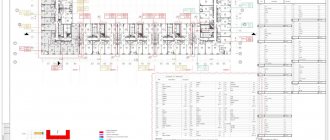Home » Housing disputes » Forced privatization of an apartment through the court
In most cases, privatization is a voluntary procedure that involves the transfer of state property into private ownership. Usually, to do this, it is enough to simply collect a certain package of documents and submit an application to the MFC (My Documents) or Rosreestr. However, in some cases it is not possible to follow such a simple path. And then you have to go to court and try to force privatization. Let's consider the details and details of this procedure.
Reasons for going to court
To summarize, you should always go to court when privatization in the standard manner turns out to be impossible. The main reasons why this situation may arise look something like this:
- Refusal to privatize without specifying reasons or specifying an unfounded reason.
- The house is not included in the real estate register.
- One of the residents refuses to privatize their housing.
Costs of litigation
Even if you do everything yourself, without involving lawyers, expenses cannot be avoided. What will be included in the mandatory expenses item:
- The fee for filing a claim in court is 300 rubles.
- The fee for privatization of an apartment in Rosreestr is 2,000 rubles.
- Certificate of family composition – 200 rubles.
- Extract from USRN – 300 rubles.
You should not rely only on these amounts, because the state duty may become higher, and you will also need some other documents or you will not be able to do without the services of a qualified lawyer.
When privatization is impossible even through the courts
Despite everything said above, in some cases privatization is impossible in principle and the court will not help here:
- The housing is in disrepair . Based on the requirements of Law No. 1541-1, such real estate is not subject to privatization under any circumstances.
- Service apartment . Service housing is not the property of the state and in the vast majority of cases is not subject to privatization. The exception is situations in which the employer voluntarily transfers the apartment to the public housing stock. Only after this can it be privatized.
- Dorm room . Dormitories, like official housing, do not belong to the state and therefore cannot be privatized either. Exception: if the entire hostel is transferred to the balance of the municipality, then the room/apartment in it can be privatized.
- Housing in a closed city . Any real estate in closed towns is not subject to privatization. There are no exceptions here.
Grounds for forced privatization
There are a number of grounds for resolving the issue of transferring an apartment into personal ownership through a legal authority - the court. Let's list them:
- The residential building in which the apartment is located is not included in the Unified State Register of Companies .
- When challenging the legal status of a living space , for example, if it is necessary to determine whether the apartment is a service apartment or not.
- If not all responsible tenants agree to the procedure for obtaining housing in personal possession (in this case, their written renunciation of their share , certified by a notary, is required).
- State or municipal authorities refuse applicants to carry out the privatization procedure (the basis for the application will be a written refusal from representatives of these bodies).
- One of the responsible tenants has gone missing (the person must have been missing for more than five years and be officially declared dead, otherwise the procedure will not be possible).
A sample form can be downloaded here.
How to forcibly privatize an apartment through the court
Forced privatization of an apartment through the court is a very complex procedure and it should be initiated only if the applicant is sure that he is really right and the refusal was groundless. In all other cases, privatization will be considered impossible.
To increase the likelihood of getting the right decision, it is better to contact experienced lawyers.
Procedure
- Make sure that the reason for refusing privatization is one that can be challenged.
- Draw up a statement of claim taking into account the specifics of the current situation (see sample below).
- Submit an application to the court.
- Pay the state fee.
- Wait for the meeting date.
- Attend the meeting.
- Get a court decision.
- Wait for the decision to take effect.
- Submit the application for privatization again, attaching the court decision to the documents.
- Obtain consent to privatization (if a refusal follows again, for a different reason, start from point 1).
- Sign the privatization agreement.
- Register ownership.
Procedure
The application should be submitted to the district court not at the place of residence, but at the location of the property (provided that they are different). However, this is not a big problem, and even if a person makes a mistake, even at the stage of accepting documents, he will be shown where to go.
After receiving the application, the court considers the case and sends copies of the claim to all parties indicating the date of the hearing. In practice, in such situations the defendant usually does not appear.
After the decision is made, it does not come into force immediately, but after about a month. This period is given to the defendant to appeal. And only after this can we try privatization again.
A court decision may contain certain requirements not only regarding the defendant, but also the plaintiff. In such a situation, you can submit documents for privatization only after taking into account these requirements.
Deprivatization of the apartment
Deprivatization is the recognition through court (forcibly) of the invalidity of an agreement on the transfer of ownership of living space . Typically, the basis for such a decision is violations when concluding an agreement to transfer property into private hands.
In order to deprivatize an apartment you must:
- Submit an application to the court , attaching to it a package of documents similar to what is submitted when applying for the transfer of rights to an apartment. Except that consent to deprivatization is not required from all persons registered in the apartment. Moreover, the voluntary return of housing to the state is called deprivatization and is carried out in a different manner.
- The request will be considered in two months . If the decision is positive, the housing will again become state property.
A sample statement of claim can be downloaded here.
The following have the right to submit an application for deprivatization:
- Persons involved in the procedure for obtaining housing.
- Official guardians.
- Child protection.
- State and municipal authorities.
- Guarantors.
- Prosecutor's office employees.
Due to the fact that privatization can be challenged at any time, there is a risk associated with the purchase of such an apartment. After the deprivatization procedure, new residents will be required to vacate the property without returning money or paying any other compensation.
Statement of claim
At the heart of everything is the statement of claim that the plaintiff files. This document must be drawn up taking into account certain rules and, most importantly, in the correct form. It is often impossible or very difficult to do this on your own, since you need to take into account many articles of legislation and correctly present information. This is best handled by an experienced lawyer.
Content
The statement of claim is drawn up taking into account Articles 131-132 of the Code of Civil Procedure of the Russian Federation. The document must provide the following information:
- Name of the court to which the application is being filed.
- Details of the plaintiff and defendant.
- Information about the legal representative (if required).
- Evidence of residence in a social apartment.
- Description of the situation.
- Requirements for the defendant and their arguments.
- List of attached supporting documents.
- Date and signature.
Sample
Making a decision
The trial may take several hearings if new facts or witnesses emerge, but a decision will eventually be made. Privatization proceedings are not always transparent and the plaintiff may be refused if he is unable to prove his claims or during the meeting facts hidden by him are revealed that contradict what was stated.
After the decision is announced, the parties are given time to challenge it. If this was not done within the specified period, a written form of the verdict is prepared. The plaintiff and the defendant receive the decision:
- Personally, if they came to court after the expiration of the deadline to receive the document.
- By mail. Letters are sent to the addresses specified in the claim.
After the court verdict is transferred to paper and handed over to the parties, they can take further actions based on it. If we are talking about satisfying the plaintiff’s demands, then he can begin to further formalize the procedure, from the moment at which he was stopped due to the circumstances that arose.
Documentation
One of the most important elements of any claim is the supporting documents. It is thanks to them that the court determines who is right or wrong, therefore it is recommended to provide the maximum:
- Receipt for payment of state duty . Without this document, the application will not even be considered.
- Statement of claim . Additionally, one copy of this document is required for each party, including the representative and the court.
- Passport of the applicant/applicants . Copies are needed, but it is recommended to keep the original with you at all times.
- Birth certificates of children . This is only relevant if minors live in a social apartment.
- Permission from the guardianship authorities . This is also only necessary if you have children under 18 years of age.
- Social rental agreement . Any other analogue will do.
- Extract from the Unified State Register of Real Estate . Issued by Rosreestr.
- Registration certificate for the apartment . Issued by the BTI.
- Extract from the house register . Issued at the local housing office or other similar office.
This list of documents is not complete and directly depends on the current situation. It is recommended that you consult with an experienced attorney before filing an application. In general, it is better to coordinate any actions in such a situation with a lawyer.
If possible, you should refrain from making any accusations or any other information that cannot be documented.
Can privatization be refused?
Going to court does not guarantee that the apartment will be allowed to be privatized. The court may refuse to satisfy claims if:
- It will be established that the plaintiff does not have the right to privatize this housing.
- There are debts for housing and communal services, which means the employer does not fulfill the terms of the social rental agreement.
- The plaintiff had previously used the right of free privatization, so now only for money it is possible to obtain ownership of an apartment. The privatization price in this case is equal to the cadastral value of the apartment.
You can try to appeal the refusal through the appellate court.
Deadlines
There are no clear deadlines for forced privatization through the court, since much depends not only on the plaintiff, but also on the defendant:
| What affects the term | Approximate period |
| Consideration of the application | From 2 months. If the defendant actively interferes, the term may extend to six months |
| Entry of the court decision into force | About 1 month |
| Consideration of the issue of privatization | Up to 2 months |
| Registration of ownership | Up to 1 month |
Dorm rooms
Dormitories and rooms in them cannot be privatized by law, but there are some nuances to this issue. If the plaintiff moved into the hostel before March 1, 2004, then privatization is possible subject to certain circumstances:
- Is it the property of municipal authorities;
- Does the housing have dormitory status at the time of application?
It can be noted that in most cases, many hostels are not provided as city property, but are still listed on its balance sheet. Privatization can be issued for such housing, since there is a rental agreement. However, even in the absence of a social contract. rental, the hostel can be privatized if it belongs to the housing stock.
Arbitrage practice
Let's look at a couple of examples from judicial practice:
Example No. 1: V.I. Kozlov appealed to the court. demanding that the refusal to privatize be declared illegal. Based on the information received, the following situation arises: the applicant submitted documents for the privatization of the social apartment in which he lives on the basis of a rental agreement. However, he was refused on the grounds that the apartment had a utility debt. The applicant does not deny this, but points out that according to Law No. 1541-1, this fact is not a basis for refusal. The court recognizes that this is indeed the case, however, on the other hand, a debt for utility bills may be grounds for termination of a social tenancy agreement, which automatically deprives the plaintiff of the right to privatize this housing. The defendant clarified that if the court makes a positive decision, the social tenancy agreement will be terminated, which did not suit the plaintiff. The parties agreed and signed a settlement agreement that the plaintiff would transfer the entire debt to himself personally or repay it in full and only then submit for privatization. In such a situation, provided that all other requirements of the law are met, there will be no refusal.
Example No. 2: V.S. Stepnova went to court. demanding that the refusal to privatize be declared illegal. The basis was the lack of consent from all residents, but Stepnova points out that the person from whom consent was not obtained has no longer lived in this apartment for a long time and does not pay his share of payments. The court decides in favor of the defendant, since the requirement for the consent of all residents is a mandatory condition for privatization based on Law No. 1541-1. At the same time, it is indicated that the plaintiff has the right to file an application to evict that same tenant and then repeat the privatization procedure.
Forced privatization of housing is a very complex procedure. Without a lawyer, it will be difficult to exercise your rights. During a free consultation, experienced specialists will clarify the most controversial and popular issues, however, in order to increase the likelihood of obtaining the desired court decision, it is better to use them as representatives.
FREE CONSULTATIONS are available for you! If you want to solve exactly your problem, then
:
- describe your situation to a lawyer in an online chat;
- write a question in the form below;
- call Moscow and Moscow region
- call St. Petersburg and region
Save or share the link on social networks
(
2 ratings, average: 5.00 out of 5)
Author of the article
Natalya Fomicheva
Website expert lawyer. 10 years of experience. Inheritance matters. Family disputes. Housing and land law.
Ask a question Author's rating
Articles written
513
- FREE for a lawyer!
Write your question, our lawyer will prepare an answer for FREE and call you back in 5 minutes.
By submitting data you agree to the Consent to PD processing, PD Processing Policy and User Agreement
Useful information on the topic
2
How to evict your roommate from your apartment
Neither legal nor civil marriages provide guarantees of long and...
3
Is it possible to evict tenants in winter?
Renting out an empty apartment is quite a profitable business, especially...
1
Privatization of land under an apartment building
You can privatize not only a separate residential building, apartment or land...
Privatization of an apartment with debts on utility bills
Debts often become the main reason for refusing privatization, thereby...
4
How much does it cost to privatize an apartment?
Privatization of an apartment is a free procedure, but only within the cost...
Demolition of privatized housing
Any housing, including privatized, under certain conditions...
In what cases can a refusal be received?
A negative decision may be made in court regarding the privatization of an apartment. This happens for the following reasons:
- If there are illegal alterations in the apartment;
- The documents provided by the plaintiff have become invalid;
- During privatization or consideration of the case by the court, forged documents were identified;
- The plaintiff did not pay utilities;
- If the applicant has already participated in privatization before.
In some cases, other reasons may arise for a court decision not in favor of the applicant.
What is it for?
Law No. 1541-1 regulates the implementation of the human right to purchase residential premises through participation in privatization.
The filing of a claim for privatization is carried out in such cases:
- When challenging the status of residential premises (removal from official status).
- If the local government refuses.
- In the absence of data on real estate in the Unified State Register.
- If there is a refusal from the residents registered in the living space to carry out the procedure (read about how to correctly fill out an application for refusal to privatize an apartment here).
The statement of claim plays a key role in the consideration of the case in court.
Real estate objects that are not subject to the right to privatization
Based on the above, it can be seen that not every housing can be privatized. The most common reason for denial of property rights is the incorrect status of the living space.
What could be wrong with real estate whose privatization is refused? First of all, this is recognition of its emergency. It is also impossible to obtain the right to own housing that is under the authority of the municipality of closed military camps, nursing homes, boarding schools, etc. The same real estate objects include service apartments and dormitories. The latter, by the way, can change their status to an apartment or rental house, which will still allow them to obtain ownership rights.
Registration of rights
The court ruling, which announced the need to allow privatization, allows the procedure to be completed. A citizen can feel like a happy owner only after the re-registration of property rights has been carried out.
State registration of real estate is carried out in Rosreestr. To apply to this authority, the newly-minted owner must have a privatization agreement, which confirms the fact of transfer of rights from the municipal authorities to a private person.
State registration is carried out on a paid basis; before submitting documents to a specialist, you must pay the state fee.
The receipt is submitted along with the application to the registration authority. The procedure for entering new information lasts no more than 10 days, after which the privatization process can be considered completed.
Today, state registration of rights to privatized real estate can be carried out in several ways:
- Through Rosreestr.
- By contacting the MFC at the location of the living space.
- By submitting an application electronically through the State Services website.
A certificate of ownership of housing is no longer issued. The transfer of rights can be confirmed by an extract from the Unified State Register of Real Estate, which should be ordered separately after completion of the registration procedure.
Opportunity to challenge
Any court decision made by the primary authority can be challenged in higher authorities. To do this, the parties are given 30 days, and this period begins to count from the moment they receive information about the verdict. If the defendant did not come to court, and the decision was sent to him by mail, then the period for challenging begins from the day the correspondence was received.
There are two instances for challenging court decisions:
- Appeal.
- Cassation.
In the case of privatization, claims are filed in district courts, which means an appeal is filed against their decisions. It is drawn up taking into account the requirements of the Civil Procedure Code. It should state when and by whom the decision was made, as well as justify the request to review the verdict. Upon review, a decision may be made:
- Leave the verdict unchanged.
- Change the decision made.
- Cancel it in some part.
- Make a new decision.
The appeal may be dismissed altogether if no compelling reasons for reconsideration are found. In all cases, the rendered verdict comes into force on the day of its announcement. If the complainant does not agree with this, he still has the right to file a cassation appeal.











